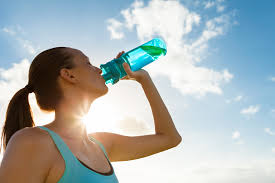Be Cool and Stay Hydrated in the Summer Heat
Now that summer is in full-swing and the hot and humid weather has arrived, it’s a good bet your AC systems and fans are in constant use. Here at Elite Sports Performance & Physical Therapy in Foxboro and Elite Health & Fitness in Stoughton, our AC units are working overtime! No matter what method you use to cool off during these summer heat waves, you want to make sure your cooling system is efficient and working properly. If not, you might be calling an expert for a tune-up or you may even need a complete (and costly!) overhaul.
Similar to our cooling systems at home, we need to make sure our bodies stay cool as well, especially when exercising in the heat. With the dog days of summer upon us, it’s a good time to review the importance of staying hydrated. For some of us, our exercise intensity will increase along with the temperatures as we prepare to return to sports in the fall. It’s important that we know how to stay hydrated and prevent the performance-sapping and potentially dangerous side effects of dehydration.

Why Staying Hydrated Is Important
As you’ve likely heard before, the human body is made up of 45% to 75% water, with most of the water stored in our muscle tissue. Water is important because it helps to transport nutrients, rid the body of waste, lubricate joints, cushion vital organs, regulate body temperature, and provide structure to the skin and tissue.
Proper hydration provides many benefits, including improved cardiac output, improved ability for the body to cool itself, and a reduction in muscle glycogen usage (which can help improve your endurance).
In contrast, dehydration can cause many issues, including decreasing the body’s ability to cool itself and subsequent overheating, compounded by a loss of electrolytes. Severe dehydration can lead to heat stroke, which can be a life-threatening condition.
Know the Warning Signs
Signs of dehydration may include dry mouth, dry skin, headache, rapid heartbeat and breathing, fever, thirst, decreased urine output, and dizziness, among other symptoms. Even if dehydration is not severe enough to lead to heat stroke or pronounced symptoms, it can still adversely affect your exercise performance by decreasing sweat rate, blood volume, and heat dissipation. At the same time, it may increase your core temperature and your rate of muscle glycogen use (and thus decrease your endurance).
Furthermore, your exercise performance is negatively affected when you’re dehydrated by as little as 2% of body weight. If your dehydration exceeds a 5% loss of body weight, your capacity for work decreases by about 30%!
Don’t Forget the Electrolytes
Electrolytes are minerals in the blood and other body fluids that carry an electrical charge, such as sodium, potassium and calcium. Sodium and potassium are the most important electrolytes that get depleted when we sweat. They are commonly found in sports drinks and ideal for those exercising for longer than 60 minutes because electrolyte replacement is most important with prolonged physical activity. If you’re exercising intensely or for hours and only hydrating with water or a low/no electrolyte beverage, you may run the risk of diluting your electrolyte levels to dangerously low levels.
So What Can You Do to Stay Hydrated and Perform Your Best?
To estimate hydration levels, you can measure the change in your body weight pre- and post-workout, training session or competition. Each pound lost during training represents 16 ounces of fluid. A loss of 2% or more in body weight means that you’re not adequately replacing the fluid lost through sweat. Since a wide variety of fluid loss in the form of sweat exists among athletes, you should develop a hydration plan that works for you, but the following guidelines may be helpful.
Before Training: Prehydrate (if necessary) for several hours before exercise to allow for fluid absorption and urine output.
During Training
Children and adolescents: The American Academy of Pediatrics recommends that children weighing 88 lbs should drink 5 oz of cold water or a flavored, salted beverage every 20 minutes during training. Adolescents weighing 132 lbs. should drink 9 oz. of cold water or flavored/salted beverage every 20 minutes.
Adults: Athletes should follow an individualized hydration plan. However, here are some general guidelines: During prolonged activity in hot weather, consume a sports drink with 460-690 mg of sodium per liter, 78-195 mg potassium per liter, and carbohydrate in a concentration of 5-10% to maintain electrolyte balance. Although your plan should be individualized based on your weight and fluid loss, a helpful guideline is to drink 6-8 fluid ounces every 15 minutes while training or playing.
Post Training: Consume adequate food and fluids, including sodium to help restore hydration. If you’re significantly dehydrated or have less than 12 hours before your next bout of exercise, consume approximately 1.5 L (50 oz.) of fluid (with sufficient electrolytes) for each kilogram of body weight lost (0.7 L or 24 oz. for each pound of body weight).
So whether you’re training with us here at Elite Sports Performance & Physical Therapy, with your team, or on your own during these hot summer months, be sure to stay hydrated to stay healthy and perform your best!
Source: Haff, GG and Triplett, NT. Essentials of Strength Training and Conditioning. 4th edition. Human Kinetics, 2016: 196-199.
